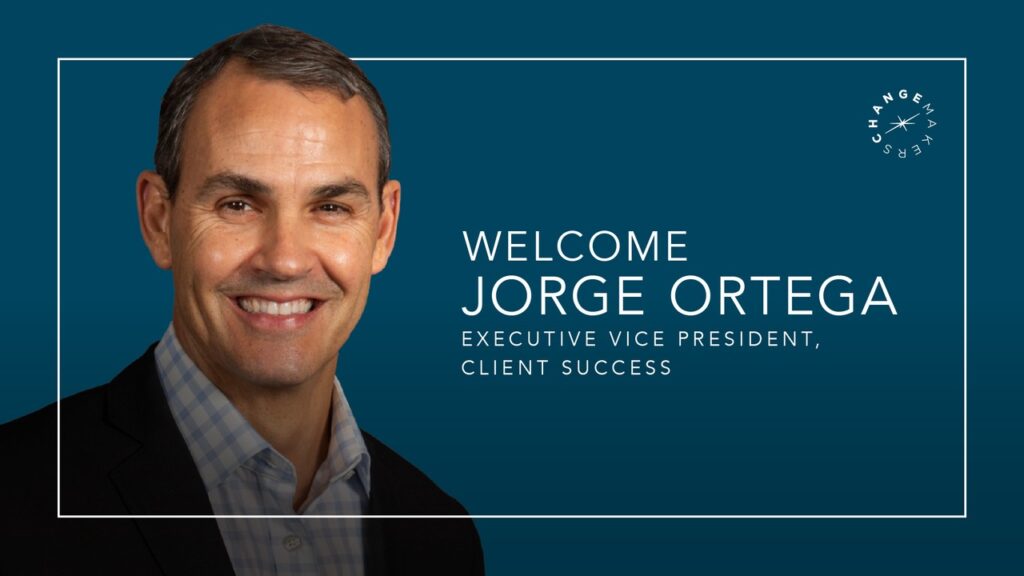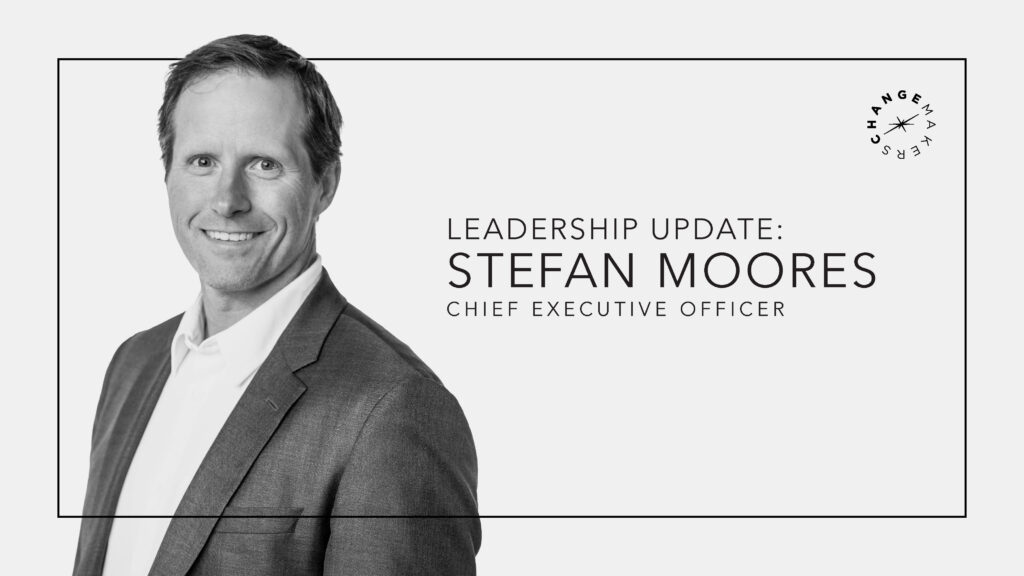What complex challenges can we help you navigate?
Email us:
health@thechangemakers.com

WASHINGTON, D.C. (April 10, 2025) — ChangeMakers, a leading North American communications and marketing firm focused on reputation and social impact, has appointed Jorge Ortega as Executive Vice President, Client Success and a member of the firm’s U.S. leadership team.
A former senior leader at two multinational agencies, Ortega brings decades of experience advising public and private sector clients on CEO communications, leadership development, brand strategy, and crisis response. He will report to Robert Gemmill, President of ChangeMakers, USA.
“Jorge is a major addition to the ChangeMakers team,” Gemmill said. “The trust he has earned from C-suite executives is evident by his deep relationships and broad experience across sectors. His leadership will be key as we grow our U.S. business and deliver the results our partners expect.”
Ortega joins ChangeMakers from CRA | Admired Leadership, where he served as Managing Director. He previously led Edelman’s southwest region and held senior roles at Burson. His career spans reputation strategy, brand communications, and high-stakes crisis response.
“Jorge’s appointment reflects our commitment to building a leadership team with both insight and impact,” said Mario Simon, CEO of ChangeMakers. “His integrity and experience align with our mission to navigate complexity for our clients.”
Ortega joins the ChangeMakers U.S. team, which specializes in helping clients anticipate and navigate complex, high-stakes communication situations. The firm uses its proprietary Reputation Score© AI platform to inform counsel and to measure and predict reputational impact in real time.
“I’m eager to bring my experience advising global clients to help ChangeMakers grow and deliver meaningful results,” Ortega said.
About ChangeMakers
For more than 40 years, ChangeMakers has helped organizations solve complex communications challenges by blending strategy, creativity, and insight. With more than 400 professionals across 10 locations in North America, we partner with clients to build stronger brands, navigate change, and drive meaningful impact. From corporate reputation and brand storytelling to social purpose and executive advisory, ChangeMakers brings together diverse expertise to help clients lead with confidence and clarity.

These days, it is easy to focus on what is new. In fact, it can seem impossible to keep up. But the 2025 State of Public Relations in Canada Report shows us that in all this change, the fundamentals: trust, ethics, and purpose, still matter.
ChangeMakers supported this research initiative because it is deeply connected to what we do – helping organizations earn trust, build relationships and communicate with clarity. The report confirms what we hear from clients every day. People want honest, clear, and responsible communication. They trust organizations that truly listen and respond with relationships in mind. And they want professionals who understand both strategy and risk to help them move their goals forward.
The three themes in the report stand out for us. Each is tied to the work we do and the outcomes we help deliver.
First, trust is still fragile.
Public trust in communications is improving, but not fast enough. The language we use to describe our work in the professional field makes a difference. Titles like “communications” and “public relations” are not interchangeable in the eyes of the public, and it affects credibility. Words matter.
At ChangeMakers, we focus clear, honest communication. Whether we’re working with government, business or communities, we understand how to engage audiences, build relationships and earn trust. We believe reputation is earned through actions, not slogans.
Second, AI is here. We need to lead.
The report shows that while our professional field is looking at efficiencies in new AI tools, business leaders are not yet turning to their communications teams for guidance on AI strategy. That is a risk. If we stay focused on outputs, we will be left out of the bigger conversation.
If harnessed correctly, AI can be much more than a tool bolted on to workflows. It can be a strategic driver that creates both new risks and new expectations. At ChangeMakers, we are responding by embedding AI into every facet of our business. The delivery of this looks different across our paradigm, but the result is consistent – higher rate of efficiency, better quality output, and getting to the solution quicker and more often. All of this is grounded in our unfettered belief in human expertise at the wheel. We believe this approach will both elevate our company and push the boundaries of what’s possible for the entire industry.
Third, professional associations matter.
Canadians want ethical oversight. They want standards they can trust across all disciplines in the work ChangeMakers does, from marketing, creative and digital to advertising, communications, change management, engagement and measurement. That is what professional associations, like the Canadian Public Relations Society, bring to the table. Professional associations are vital platforms for leadership and help keep the focus on what matters: relationships, ethics and public trust.
ChangeMakers supported this research because our clients and their audiences are living these issues every day.
Whether it is misinformation, shifting expectations, or AI uncertainty, we help our clients anticipate those challenges, navigate complexity, and create results that matter. This report confirms that our work is more important than ever.
Let’s keep the conversation going.

ChangeMakers, one of North America’s leading independent strategy and communications firms, announced Stefan Moores as Chief Executive Officer. The appointment reflects the firm’s ongoing evolution to an integrated, AI-native consultancy at the intersection of change, markets, and people.
“Stefan has the business acumen, entrepreneurial spirit and integrity that has earned him the trust of his team. We are energized by his leadership thus far and look forward to all that ChangeMakers will accomplish together under his guidance,” said Dale Tingley, Co-Managing Partner of the Canadian Business Growth Fund (CBGF) and Chair of the Board. “Under his leadership, ChangeMakers is well positioned to make waves in today’s evolving business market.”
“Our aspiration is simple: make ChangeMakers the most trusted partner for organizations and leaders who seek to achieve measurable business outcomes. Whether it’s tangible results like sales or revenue, or the harder to quantify cultural and reputational measures, communications is the engine that powers progress,” said Moores. “We will be on the cutting edge of AI, technology and innovation while keeping our focus on the human-centered relationships that build trust, drive results, and enhance reputation. That’s how we will deliver value every day.”
Moores’ vision for the company centers around the drive to positively impact every client’s business, from strategic planning through organizational change management and market execution. Whether navigating executive leadership changes and cultural challenges, or driving awareness and sales, ChangeMakers is the strategic partner that helps leaders execute well and move confidently.
“Whether change is the chosen path, or takes our clients by surprise, our role at ChangeMakers is to turn it into a strategic advantage,” said Moores. “We see massive opportunity in leveraging our expertise in crisis and risk management, organizational change management, public relations, marketing and social impact to change the way companies think about, execute and capitalize on change. We do that by applying all our different crafts with technology and human expertise to move with confidence.”
Moores is uniquely positioned to take ChangeMakers into the future. He brings decades of experience in business management, human resources, finance, investment and operations at leading management consulting, communications and public affairs firms across Canada and the U.S. Most recently, Moores served as Chief Operating Officer for ChangeMakers. He also previously served as President of Argyle and co-founder of The Castlemain Group. Moores holds an MBA from Stanford University Graduate School of Business, an MSC in International Politics, Economics and Business from The London School of Economics and Political Science, and a BA in Economics from Queen’s University.
“The next era of communications belongs to the doers — those who don’t ask if change can or will happen, but how to make it work. That’s the mindset we’re building at ChangeMakers,” added Moores.
ChangeMakers’ independence and cross-sector expertise allow it to deliver outcomes—not just activity—for the C-suite, senior leadership and the teams they lead. With more than 400 professionals across 10 North American offices, the firm offers end-to-end, sector-shaped solutions that help clients thrive through disruption and emerge stronger.

Across industries, transformation is constant. If you’re not evolving, you may be left behind. But the difference between success and failure isn’t simply who adapts fastest or the most. Those who will emerge as leaders in today’s business environment will be those who embrace and drive change best.
That’s why communications teams can no longer afford to sit at the end of the decision chain to receive and act on a mandate—they must be present at the decision-making table, shoulder-to-shoulder with the C-suite. The communications function is capable of more than storytelling, media, and advertising if you allow it.
At ChangeMakers, we demand it.
For too long, communications has been the messenger—not a co-architect—of business strategy. The result is often reactive campaigns, fragmented programs, or missed opportunities.
We’ve entered an era that requires communicators to understand – and are given visibility into – the entirety of an organization and business context before executing on a task. Communications deliverables are a means to the end.
To achieve business outcomes, communications must be at the core. Whether advising on organizational design, reputation risk, or stakeholder trust, engagement must be strategic, intentional, and continuous. Otherwise leaders will fail to build the trust required to execute successfully.
That’s why our role at ChangeMakers extends beyond “telling the story” to building the systems and approaches that make stories credible. We’re helping set direction, identifying roadblocks, and supporting organizational changes to meet and exceed expectations. This requires effective integration—across disciplines, crafts, and technologies, both internally and externally.
Immeasurable strength comes from integrating the entire communications landscape — from marketing and brand strategy to crisis management, organizational change, and social-impact advisory. Our excellence across this diverse skill set gives us an unmatched perspective that informs our approach to every business challenge.
Communications can lead the next decade of organizational transformation. Doing so will require courage to collapse silos, to rethink traditional models, to show up in boardrooms armed not only with creative ideas, but with data, foresight, and strategic authority.
For CEOs, boards, and senior leaders, strategic communications must be viewed as a key driver in every plan to achieve business outcomes. It’s the force multiplier — aligning people on the why, increasing adoption and execution, protecting reputation, and unlocking growth. Whether you’re introducing AI, repositioning a brand, driving rapid growth, responding to a crisis or reputational risk, or delivering social impact at scale, success depends on your ability to bring people with you – and communications is the catalyst for success.
People across every organization are using some form of AI – whether it’s endorsed or not. At its best, AI offers a promise of net new solutions, efficiency, cost reduction and automation. Executed inconsistently, it risks eroding trust and value among stakeholders that matter most.
The most effective transformations pair data intelligence with human expertise — the ability to listen, interpret, give and take, and adjust. At ChangeMakers, we leverage technology to provide data and insight so our teams can focus on strategic counsel: shaping messages that move markets, align employees, or attract investors.
AI is embedded in how we analyze sentiment, forecast risk, and measure impact. It helps us measure what was previously immeasurable. Our Reputation Score can quantify your reputation, analyze how competitors compare, predict reputational risk, and identify avenues for future growth.
In another case, we’re going beyond talking with clients about how AI-powered tools like ChatGPT, Gemini, and Google’s AI Overviews change the way people find information. We’re proactively workshopping content strategies and messages that resonate across audiences and organizational contexts, and are structured so AI tools can find, understand, trust, and quote them.
No one person can keep up with the pace of change set by AI and technology. It requires partnership with a trusted advisor who can help you set the path and filter what’s valuable amidst the noise.
The pace of change today—technological, societal, regulatory—can feel overwhelming. Change is hard. And can be exhausting. Especially when poorly managed.
Organizations with strong change management deliver 264% more revenue growth than those that don’t. What does “strong change management” mean? Following a change management methodology is not enough. Leaders must leverage their strategic communications team to take organizational change beyond process and protocols to embed lasting shifts in culture, performance, and resilience that maximize success.
When done well, change builds credibility and confidence. When done poorly, it destroys both. Strategic communications is the difference.
At ChangeMakers, that’s our purpose and our promise: to help leaders and their organizations navigate complexity with clarity, integrity, and measurable results.
You can’t stop change. But you can do it well.

America’s hospitals are running out of time. Staffing shortages are closing clinics, emergency rooms are over capacity, and clinicians are leaving faster than new ones can be trained. Burnout, backlogs, and budget shortfalls are eroding the foundation of care. The system is strained and signaling the need for urgent change and decisive leadership.
At the same time, artificial intelligence (AI) tools are advancing quickly, promising to automate documentation, predict risk, and personalize treatment. Hospitals stand to reclaim thousands of clinician hours each year, reduce administrative costs, and ease burnout, improving access and efficiency across the system.
The American Medical Association has already warned that adoption could stall if hospitals fail to address clinician and patient concerns. Without thoughtful rollouts that build genuine trust, even the best technology may fall short, leaving significant investments with little real-world impact.
Hospital leaders can’t afford to miss — or mishandle — this moment. Smart organizational change management will determine whether we succeed with one of healthcare’s most transformative opportunities in a generation.
Before we ask patients and clinicians to adopt AI, we must answer why the change should matter to them. Talk about AI tools in terms of human outcomes that benefit the users, like more face-to-face time with providers and less burnout for clinician, rather than in business terms like “efficiency” or “innovation.”
For example: “We know how frustrating it can be when clinicians spend visits typing into a laptop instead of fully engaging with you. We envision a future where conversations are face-to-face, uninterrupted, and centered on your needs. That future is possible with the help of our new AI-powered documentation tool.”
Patients and healthcare professionals need to see that these technologies bring time back to them to help them achieve their goals. If healthcare leaders fail to demonstrate that purpose clearly and repeatedly, adoption will remain half-hearted.
Actions: Align the rollout of AI tools with end-users’ values and goals. Every staff meeting, town hall, and newsletter should connect technology to purpose.
AI in healthcare evokes legitimate fears — of inaccuracy, data sharing without consent, and the loss of human connection. These concerns are shared by both clinicians and patients. Ignoring them, or labeling skeptics as “resistant to change,” only guarantees greater resistance.
Clinicians don’t inherently reject technology, rather they question anything that might compromise patient care. Patients are no different; they want the best outcomes possible and are protective of their privacy. These concerns are indicators of where trust must be earned, and leaders who name fears early can shape the narrative before it shapes the AI initiative.
Hospitals must name and address these worries before they metastasize into distrust. Be transparent about what isn’t working today and show how AI tools can relieve those pain points. Create open forums for clinicians and patients to raise questions, and publish clear, honest answers. Treat skepticism as data revealing where design improvements, education, reassurance are needed most.
Actions: Build structured channels for feedback during pilot phases and early rollouts. Make it visible that concerns are understood and lead to change. Transparency is the currency of trust.
The biggest mistake leaders make is treating AI implementation as a checkbox. Real transformation takes time to test, adjust, and rebuild workflows.
It’s no different than inviting nurses, physicians and surgeons to test a new operating room layout before it is built into a new hospital. Hospitals must plan for adaptive rollout with visible iteration. Invite early adopters to become change champions by testing the technology, informing instruction and rollout, and sharing watchouts. The goal is sustainable progress. When patients and clinicians see that leadership is listening and adjusting, they engage with curiosity instead of compliance.
Action: Budget for iteration. Measure success by improved satisfaction, reduced burnout, and visible workflow efficiency.
AI has the power to give patients and clinicians back their most precious resource: time. But that future depends on decisions made today. If leaders don’t invest as deeply in building trust as they do in technology, the promise of AI will stall in the waiting room.
It’s time for leaders to stop asking “Is the technology ready?” and start asking “Are our people ready?”



Novel molecules, innovative mechanisms of action, new indications, loss of exclusivity, drug shortages, reimbursement challenges, evolving models of care… and the list goes on.
At ChangeMakers Health, we help clients navigate today’s complexities and anticipate tomorrow’s challenges — all in service of improving care and creating better lives for patients.
We partner with pharmaceutical companies, healthcare organizations and patient advocacy groups. Together, we help patients access potentially life-saving and life-changing medications and treatments. We educate patients and the public about chronic conditions and treatment options. We work to strengthen our healthcare system — ensuring people receive accurate, empowering information to support informed care with our dedicated healthcare providers.
To find out more, or engage our team, email us at:
health@thechangemakers.com


Crohn’s and Colitis Canada
Senior Manager, Communications and Public Relations
Meaningful change is not possible without collaboration because trust is foundational to great work. Our goal is to become an extension of your team, building a strong and lasting relationship






Email us:
health@thechangemakers.com



The field of public engagement continues to evolve—especially in the context of complex, high stakes decision making.
For more than 25 years, the IAP2 Spectrum of Public Participation (the Spectrum) has served as the cornerstone framework for how public participation is understood, practiced, and evaluated across sectors and geographies.
ChangeMakers has been proud to support IAP2 Canada in contributing to the global evolution of the IAP2 Spectrum by designing and hosting engagement to bring Canada’s voices, values, and practices to the table in shaping the next version of this foundational tool.
Why We Engaged
You can’t change your field without engaging your field.
As engagement professionals, we are no strangers to navigating change, but we also know that change can be challenging. Engaging practitioners meaningfully on the Spectrum required opening space for reflection, conversation, and collective insight within our field.
As a strategic partner to IAP2 Canada, ChangeMakers led the development of a national Thought Exchange survey, interviewed interest holders, and convened practitioners at the IAP2 North American Conference in Ottawa to gather insights, test language, and surface tensions about the Spectrum.
We asked: How should the Spectrum serve our field and the public for the next 25 years? What is working well? Where is it holding us back? Does everyone see themselves reflected in the spectrum process?
What We Learned, and What It Means
Our engagement surfaced a wide range of perspectives on the Spectrum – some saw it as a vital tool for managing expectations and engaging effectively, while others found it limiting or felt it no longer reflects the realities of their communities. Bringing divergent viewpoints together was essential to ensuring that any changes explored reflect a breadth of needs and experiences.
This process deepened our understanding of what is at stake. The Spectrum is more than a visual in an engagement plan—it’s a signal to the public about how their voices will be treated, and a tool for institutions to build legitimacy in their decision-making processes. That power demands accountability, adaptability, and clarity.
What’s Next?
When IAP2 International publishes the updated Spectrum, ChangeMakers will be among the first to renew and refine our internal approaches to align with this evolution in the practice of engagement to meet the public’s expectations, and we will help our clients do the same.
Our call to action is: Be bold in your field. Engage with your peers to explore the possibilities of change. Be excited to innovate and push your practice while being open to hearing others’ experiences and perspectives — because that is where deep insights, great ideas, and shared solutions emerge.We’re proud to be part of a growing, global community of public engagement practitioners and to be playing a key role in advancing this important work.
Are you reflecting on your organization’s approach to engagement and how it can be most impactful in creating or navigating change? Or are you stumped by a particularly complex project? Reach out, we’d love to chat.
About the Authors
Sarah Chau Bradley / Director, Engagement, Strategic Communications
Sarah is a communications and engagement professional with expertise in tailored consultation for diverse urban communities. She brings ten years of experience from the private, public, not-for-profit, and philanthropy sectors and strives to create spaces for engagement that are welcoming, inclusive, and culturally relevant.
Rhianne Fiolka / Manager, Engagement and Communications
Rhianne Fiolka is a Manager of Engagement and Communications at ChangeMakers, specializing in urban planning, equity, and accessibility-related projects. Rhianne is passionate about Equity, Diversity, and Inclusion (EDI), facilitating authentic conversations, and promoting social justice.
Chrystiane Mallaley / SVP, Engagement
Chrystiane is a long-standing IAP2 member and leads ChangeMakers’ Indigenous, Public, and Interest Holder Engagement Services. She partners with Indigenous and non-Indigenous governments, businesses, not-for-profit organizations and communities to strengthen relationships and create meaningful engagement on complex projects and policy challenges.

ChangeMakers is proud to announce a major win in health advocacy, securing a strategic partnership with the Alberta Association of Optometrists (AAO) to champion the importance of eye health for all ages.
Through a province-wide campaign, ChangeMakers will help spotlight the critical role of regular eye exams in early detection and prevention, from infancy through to senior years. This collaboration will not only strengthen awareness of eye health but will also mark the beginning of an exciting new client relationship.
“Our partnership with ChangeMakers reflects the agency’s understanding of our mission and its ability to bring it to life through compelling storytelling and strategic communications,” said Brian Wik, CEO at Alberta Association of Optometrists. “We look forward to working together to amplify our advocacy efforts and improve access to essential eye care services.”
As a leader in purpose-driven communications, ChangeMakers will support AAO with a multi-faceted strategy, including strategy, creative and content development, earned media, influencer strategy, digital marketing, and media buying.
“Our work with AAO reinforces ChangeMakers’ commitment to advancing meaningful causes through impactful marketing and reputation management,” said Alyssa Huggins, President of Marketing, at ChangeMakers. “We’re honored to support the Alberta Association of Optometrists in raising awareness of its vital initiatives that protect vision and improve lives across Canada and beyond.”
About ChangeMakers
ChangeMakers is a 400+ person independent reputation management, social impact and marketing firm with offices throughout North America. ChangeMakers combines deep business specialization with human-centered strategies, working alongside our clients to strengthen their reputation and succeed in a disruptive world.
About the Alberta Association of Optometrists
The Alberta Association of Optometrists is Alberta’s leading optometric professional organization, representing more than 900 Doctors of Optometry in over 120 communities across the province. AAO members are highly trained regulated health professionals providing primary eye health and vision care to Albertans. For more information, please visit optometrists.ab.ca.
View the story at StrategyOnline:
“ChangeMakers teams up with Alberta optometrists”
https://strategyonline.ca/2025/03/19/agency-news-hover-group/

Reaching youth in Canada with relevance and impact can be challenging. That task becomes even tougher when the target in question is marginalized Indigenous youth.
It was this objective, engaging marginalized at-risk youth, that was put before ChangeMakers when the Manitoba Association of Chiefs of Police asked us to develop a marketing campaign that would encourage at-risk youth in Manitoba to avoid gang membership or leave a gang entirely.
Audience research is often a critical starting point for informing campaign nuances. In this case, it became the bedrock of our marketing plan. ChangeMakers sought to immerse ourselves within this target demographic’s experiences to fully understand what, where, and how to convey our sensitive message.
That meant surveying a broad spectrum of individuals and groups. We spoke to gang prevention officers with the Winnipeg Police Service as well as staff members at The Link, a Winnipeg-based agency that works with marginalized youth and families daily.
Most importantly, we held intense interview sessions with reformed gang members. These streetwise interview participants gave honest and unfiltered answers as to how we might effectively connect with marginalized youth, as well as insights on what we might seek to avoid.
Through this stakeholder research, ChangeMakers’ Social Impact Consulting team arrived at the important understanding that striking the right tone would become a crucial element in our campaign communications. The difficulty in not coming across to youth as “lame” or “corny” can be a hurdle with youth marketing at the best of times. This nuance is magnified further when communicating an issue as fraught and intense as gang membership.
ChangeMakers’ media team examined content and media platforms that were popular among our target demographic and our creative team built the campaign messaging tailored to those digital venues. Additionally, we knew that our ads had to capture our audience’s attention within the first three seconds or else they would be missed.
Based on the insights gathered, we created three short videos that illustrated the vast difference between the myth and the reality of gang life. We employed a video game look and feel that was both relatable and shareable. A text number at the end of each video encouraged viewers to send a message to The Link which was monitored 24/7, offering a lifeline to those seeking help with either leaving gangs or resisting their solicitations.
Our choice of media platforms (TikTok and Snapchat) was perhaps the most important decision in our campaign planning. The campaign’s full-screen mobile video placements, which ran across these platforms, were central to engaging our niche audiences in an immediate and relatable way.
While tone and media were crucial elements in informing our content, subtle information about gang culture was also vital in helping us establish credibility. These insights included scenarios and recruitment tactics that gangs use, as well as the differences between male and female recruitment tactics.
In building the story, we knew our messaging needed to connect and build trust with marginalized youth. By further developing our understanding of their sentiment towards colonial institutions, including policing, we avoided branding our campaign messaging with overt police or law enforcement insignia. Instead, we partnered with The Link, which had already established trust and relevance with this audience. And finally, leaning on the important insights gathered, our messaging was careful to stress that we were in no way advocating “snitching” on existing gang organizations.
Results:
This campaign successfully generated a significant increase in responses from vulnerable youth.
Over the past three years, on average, assistance has been provided to between 20 to 30 youth annually. Following our “Gang Life Is No Life” media campaign, that number jumped to more than 150 referrals (a 600% increase) and conversations between The Link and youth in Manitoba continue each month.
Some Key Lessons Learned:
About the Authors
Hilary Friesen / VP, Social Impact Consulting
Hilary is an established expert in fostering behavioural change for organizations large and small. Over more than 17 years, she has led social marketing programs in injury prevention and return to work and has overseen multi-faceted social impact communications programs for diverse public sector clients at ChangeMakers.
Varinder Brar / Director, Social Impact Consulting
Varinder is a Director with 15 years of experience in social impact marketing and communications. He lives in Winnipeg and when he’s not working you can find him coaching basketball at Sisler High School.

ChangeMakers has been named the Agency of Record for Save the Children in Canada, building on the numerous successful campaigns the agency has executed on behalf of the charity since 2023.
“Our continued trust in ChangeMakers reflects the agency’s deep understanding of our mission and ability to bring it to life through compelling storytelling and communications,” said Jessica Bryant, Head of Communications, Media and Public Relations at Save the Children. “We look forward to continuing to work with ChangeMakers to amplify the work we are doing around the world and here in Canada to improve the lives of children.”
With ChangeMakers’ proven track record in purpose-driven and non-profit campaigns, the agency will be providing support in influencer programs, media relations, celebrity ambassador programs, DEI communications, issues management, crisis communications, and digital campaigns.
“Our work with Save the Children underscores ChangeMakers’ commitment to advancing meaningful causes through our reputation management services,” said Caroline De Silva, Senior Vice President, Consumer at ChangeMakers. “We’re honoured to continue supporting Save the Children to elevate its profile in Canada and raise awareness of its critical programs that benefit children around the world.”
About ChangeMakers
ChangeMakers is a 400+ person independent reputation management, social impact and marketing firm with offices throughout North America. ChangeMakers combines deep business specialization with human-centered strategies, working alongside our clients to strengthen their reputation and succeed in a disruptive world.
About Save the Children
Save the Children believes every child deserves a future. In Canada and around the world, we give children a healthy start in life, the opportunity to learn and protection from harm. We do whatever it takes for children – every day and in times of crisis – transforming their lives and the future we share.
View the story at Adnews:
“Save the Children retains ChangeMakers”
ChangeMakers offices and team members are located across North America within the traditional, Treaty, and unceded territories of First Nations, Inuit, and Métis Peoples.
Our team is currently engaged in the development of a Truth and Reconciliation Action Plan for our company. The Truth and Reconciliation Commission of Canada called upon the corporate sector in Canada to “adopt the United Nations Declaration on the Rights of Indigenous Peoples as a reconciliation framework and to apply its principles, norms, and standards to corporate policy and core operational activities involving Indigenous peoples and their lands and resources” (Call to Action 92).
Our Action Plan is an important measure we are taking as a company and we look forward to updating with more information about this plan and the actions that reflect our commitments as a team.